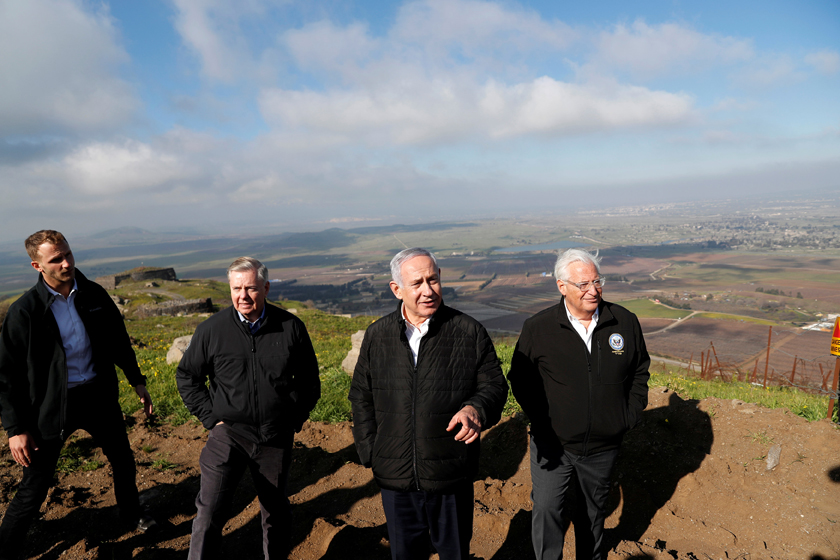US poised to recognize Israeli sovereignty over Golan

US recognition of Israeli sovereignty over Syria’s Golan Heights now looks to be a matter of when, not if. In terms of the timing, we are probably looking at this year or next, but not later than that.
The Israeli government has been lobbying the US to do so throughout Donald Trump’s presidency. Prime Minister Benjamin Netanyahu’s office has made no secret of that, saying he has spoken to Trump “on many occasions” about “the need to recognize Israeli sovereignty” over the Golan.
There were indications last year about a possible change in the US position. In May, Israel’s intelligence minister said his country was close to convincing Washington to recognize Israeli sovereignty.
In September, the US ambassador to Israel, David Friedman, said: “I frankly cannot imagine a situation in which the Golan Heights is not part of Israel forever.” And in November, the US opposed for the first time a UN resolution calling for Israel to end its occupation of the Syrian territory, breaking its long-standing stance of abstaining.
But this year is seeing a marked intensification of American and Israeli efforts in this regard. Last month, legislation was introduced by Republicans in the US House of Representatives and the Senate to recognize Israeli sovereignty over the Golan.
On Monday, Republican Sen. Lindsey Graham, flanked by Netanyahu and Friedman, said he would lobby the Trump administration in this regard. On Wednesday, Republican senators Ted Cruz and Tom Cotton, as well as Republican Congressman Mike Gallagher, urged their government to recognize Israeli sovereignty.
That same day, it was widely reported that the US State Department, in its latest annual human rights report, changed its usual description of the Golan from “Israeli-occupied” to “Israeli-controlled.” And Israeli media has reported that Netanyahu will raise the issue of sovereignty with Trump when he visits Washington later this month.
With Israeli elections taking place next month, Trump may decide to give Netanyahu, a staunch political and personal ally, a boost at the ballot box by recognizing Israeli sovereignty over the Golan. Or Trump may decide to push back recognition until closer to next year’s US elections and reap the political rewards himself. Either way, it seems that US recognition is only a matter of time.
Keeping Golan has been Israel’s objective since long before the Syrian conflict began in 2011.
Sharif Nashashibi
In lobbying the Trump administration on this issue, Israeli and American politicians are exploiting the increased influence of Iran and its Lebanese ally Hezbollah in Syria. Portraying this as a threat to Israel, they claim that this necessitates US recognition of its sovereignty over the Golan.
But this threat is fictitious. Throughout the Syrian conflict, and with increased frequency, Israel has targeted Iranian and Hezbollah forces and weapons in Syria with impunity. Threats of retaliation from Tehran and Hezbollah have proven utterly hollow. And even if they did pose a threat to Israel, recognizing its sovereignty over the Golan would do nothing in practical terms to reduce that threat.
This is simply a ploy to achieve an objective expressed unequivocally by Netanyahu in November 2018: “Israel will remain forever on the Golan Heights, and the Golan Heights will forever remain in our hands.”
That has been Israel’s objective since long before the Syrian conflict began in 2011, and long before the rise of Iran’s regional influence and militarism following the US invasion of Iraq in 2003. The difference now is that Netanyahu sees that he has a receptive ally in Trump, who is widely viewed in Israel and beyond as the most staunchly pro-Israel American president ever — and that is saying something.
From Trump’s point of view, he has nothing to lose and much to gain from recognizing Israeli sovereignty over the Golan. If he does so, he will face widespread condemnation from the international community, which has never recognized Israel’s occupation of the Golan since 1967 or its annexation of the territory in 1981. But the international community will respond with nothing more than that.
Meanwhile, Trump will face no political backlash domestically, since Israel enjoys unflinching bipartisan support in the US (the legislation introduced last month by the Republicans is also supported by senior Democrats). Given the influence of the pro-Israel lobby in the US, recognizing Israeli sovereignty over the Golan would be a huge political boost for Trump and his Republican Party, with elections on the horizon.
Trump’s calculus in this regard would not be a matter of speculation — it is already tried and tested. His recognition of Jerusalem as Israel’s capital in 2017, and the moving of the US Embassy to the city from Tel Aviv last year, caused a storm of protests worldwide that dissipated without any negative repercussions for the US, Israel or Trump himself.
If he got away with it over Jerusalem, what would stop him over a territory with less global significance? And as is happening with Jerusalem, what would stop other governments from following suit?
• Sharif Nashashibi is an award-winning journalist and commentator on Arab affairs.
Twitter: @sharifnash









































